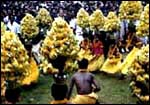

|
|
|
|
| HOME | TRAVEL | TRAVELOG | |||
| September 1, 1997 |


Shobha Warrier Onam for us is flowers Of every conceivable hue and colour, heralding the softness, the romance, the joy of life. More practically, Onam heralds the harvest festival -- the lush fields and bursting granaries mute, but eloquent, testimony to nature's bounty. It is also, legend holds, that time of the year when Mahabali, legendary ruler of yesteryears, returns from his home in the depths of the netherworld to visit his loyal subjects. For me, though, it is memory, not Mahabali, who is the inevitable visitant. Memories of a childhood spent anticipating the approach of Onam and, come the festivities, bustling about, self-importantly collecting flowers for the pookkalam (flower arrangement).
Nowadays, the Keralite tends to lament the lack of space, the proliferation of houses and, consequently, the almost total absence of flowers -- most especially the white, bell-shaped thumba that is a must in any pookkalam worth the name. In the days before communism influenced the Keralite outlook, it was the duty of the poor workers to toil hard in the fields and the backyards of the feudal lords and supply all that they had harvested to their lords. The lords for their part sat fanning themselves, listening to music and dance, and waited for the fruits of somebody else's labour to reach them. Come the festival, the workers brought onakkazhcha or Onam offerings and the landlords in turn gifted them with onakodi or new clothes and some money. With the advent of communism, however, this structure disappeared. Now, the labourer gets the fruits of his labour and if a landlord sits fanning himself, then all he has to show at the end of it is an aching forearm. Of course, it so happens that the rice fields of Kerala are becoming extinct -- even in Kuttanand, once termed the rice bowl of Kerala, houses have taken over where once lush green fields stood ripe for the harvester's sickle. The quarterly examinations were over by then, so all we kids had to do was play. Families made it a point to congregate in the ancestral home -- the maternal grandmother's ancestral home, since we follow the matrilineal system -- to celebrate. And boy, was it fun. Around a dozen cousins under one roof, all clamouring for the one swing that would hang from the branches of a mango tree waiting for us. The ladies toiled long and hard in the kitchen, dishing up the elaborate feast that was a must. In fact, the saying went Kaanam vittum onam unnanam or "Even by selling off your lands, you must feast at Onam time". For us, of course, the fun lay in sneaking in behind their backs and swiping as much of the delicacies as we could stuff into the pockets of our skirts. And back, bulging pockets and all, to squabble over whose turn it was to swing, and whose to push. Those days, there were no state-sponsored Onam programmes. The luncheon feast over, we either went for a film, or to the beach, or to the park in the evenings. Of course, the more traditional households -- ours was one of them -- had their own entertainment laid on, in the form of a post-prandial thiruvathira kali ( a folk dance form). These days, we sleep after the meal. Times, as the elders say, are changing. Today's state-sponsored Onam celebrations have been receiving flak from the conservatives and intellectuals but frankly, I like the idea. If it weren't for the state's interest, Kerala's streets wouldn't be decked up, there wouldn't be the strains of music permeating the air -- for not too many private households of the ancestral variety exist today, and the ones that do exist are no longer able to celebrate like before. Thus, the sponsored celebrations -- invariably held in the cities -- draw visitors from the neighbouring villages, in their thousands. The streets are chockful of happy, celebrating people, the halls reverberate to the sounds of music and dance, and for today's generation, it is the only way to keep abreast of the dying arts of Kerala such as theyyam, ottamthullal, kalaripayattu et al, all of which form part of the programme. Interestingly, Onam's legendary origin seems peculiarly apt to today's environment. It is said that during the reign of Mahabali, an asura king, all citizens were happy and content, there was no caste, no religion, no other form of discrimination. All of which, of course, made Mahabali very popular -- to such an extent that even the devas became jealous of him. At their earnest pleading, Lord Vishnu came down to earth as a small Brahmin boy and, by strategem, banished him to the nether regions -- but not before Mahabali earned the right to visit his subjects one day in the year. The Kerala government, of course, has now extended Mahabali's visitation rights to an entire week -- which is how long the state-sponsored celebrations last. What I appreciate most about the state celebrations is that as in Mahabali's time, it does away with discrimination between the poor and the rich -- at least for the duration. It is an inspiring sight, to see all Keralites, irrespective of class, caste and religion getting together, moving through the crowded roads, rubbing shoulders with one another and celebrating in joy and harmony. That, after all, was the spirit of Mahabali's reign -- a society based on equality, on the oneness of human beings.
And it is a message peculiarly apt in today's turbulent times...
|
|
|
|
|
HOME |
NEWS |
BUSINESS |
CRICKET |
MOVIES |
CHAT
INFOTECH | TRAVEL | LIFE/STYLE | FREEDOM | FEEDBACK |
|